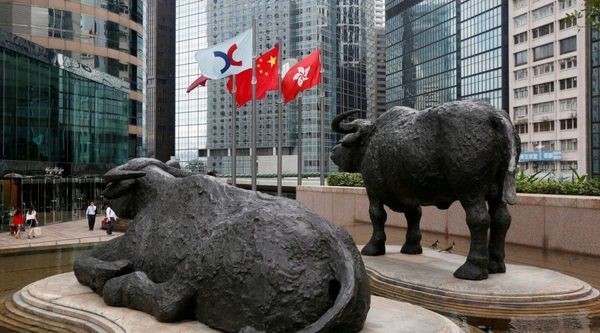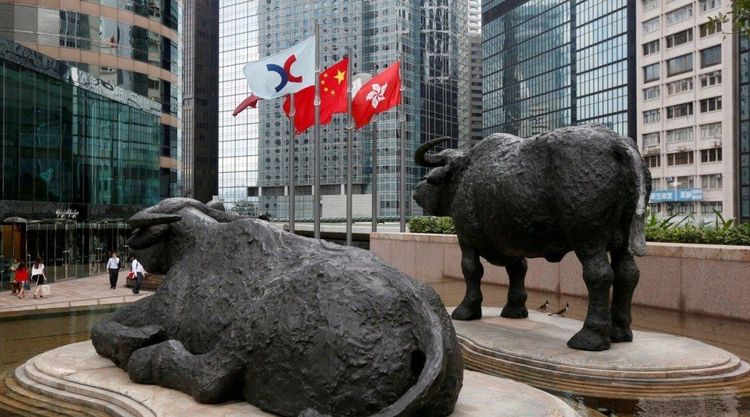When U.S. biotech startup Sorrento Therapeutics named ex-Lehman Brothers executive Jiong Shao as its new finance chief about two months ago, it was widely seen as a move driven by his background in raising capital for Alibaba and Tencent.
Sorrento Therapeutics Inc is among a few early-stage U.S. biotechs wary of being overlooked in a crowded New York stock market and looking at listing itself in Hong Kong as Asia’s financial center rolls out the red carpet with a drastic overhaul of listing rules.
Striving to catch up with New York and Shanghai as an IPO hotspot, the Hong Kong Stock Exchange announced new policies late last year that actively court biotech companies, including those that do not have a drug on the market.
The new rules particularly target early-stage biotech companies with a minimum market value of about $200 million, including those that do not yet earn revenue.
Sorrento, which is developing CAR-T cancer drugs and medicines to treat pain, is among a group of companies that believe they will get a more enthusiastic reception in Asia – and with it a higher valuation and more money.
“We strongly believe we are under-appreciated in the U.S. and our shareholders deserve more,” Chief Financial Officer Shao told Reuters.
In February, the drugmaker announced plans to pursue a second listing in Hong Kong in a letter to shareholders.
Sorrento has since said it expects to complete the listing by the end of the year or in the first quarter of next year and believes investors in China are especially keen to pump money into CAR-T drugs, a new generation of cancer medicines that involve genetically manipulating patients’ immune systems.
“In Hong Kong there’s only one company that has a CAR-T program, which is Genscript Biotech Corporation, and it has a market value of around $6 billion. That has appreciated from about $700 million since last year, so you’re talking about an 8 to 10 fold appreciation,” Shao says.
Wendy Pan, a partner at law firm Sidley Austin LLP, who convened a group of biotech companies and investors to provide industry feedback to the Hong Kong Stock Exchange on revamping the rules, says early-stage biotech firms are valued higher in China than in the U.S.
“A lot of general funds in China are now setting up dedicated healthcare teams and are willing to pay more just to get into the space,” she said.
Pan estimates that by the end of the year, about half a dozen biotechs will probably list in Hong Kong, and another 10 will have submitted their applications.
BIOSIMILAR ATTENTION
Intense competition for capital in the United States, especially in revolutionary new fields of drug development like gene therapies and immuno-oncology, is also helping drive more smaller fish to foreign waters.
David Wang, Senior Managing Director at healthcare investor OrbiMed Asia, cites biosimilars – FDA-approved knock-offs of biologic medicines which are made in living cells – as one technology attracting a lot of attention.
“Some companies from a U.S. perspective are not novel, but for China … they are a very novel thing,” Wang said.
“If you’re a biosimilar company in the U.S. people don’t believe that’s going to be a big deal. However, in China biosimilar is big stuff.”
With a lack of experience, however, comes more risk in a capital-intensive sector where firms often have no revenue at all to show when fundraising.
A number of analysts also say that there is no big shortage of capital for biotech in the United States.
“Biotech investing is a little bit of a minefield… (and) in a market that’s not used to investing in early stage biotech, it comes with a lot of risk,” Oppenheimer analyst Mark Breidenbach said.
“I don’t see any of my other companies flocking to list on the Hong Kong exchange.”
If reports on one of the sector’s unicorns, Jeff Bezos and Bill Gates-backed blood-testing company Grail Inc, are anything to go by, however, company executives are being attracted by the enthusiasm of Asian investors.
Bloomberg reported earlier this year that Grail, which already raised $900 million to support its trials last year, would reel in $500 million in Hong Kong.
Ira Pastor, CEO of privately held Bioquark, also argues that there might be more money in total in the private equity space than ever before, but for smaller companies “its not going to come from U.S. private equity.”
“Clearly it (Hong Kong) is an area of the world that there’s a lot of wealth floating around in (and it) represents a pool that maybe even understands our story a little better than the U.S.,” he said.
Reuters




